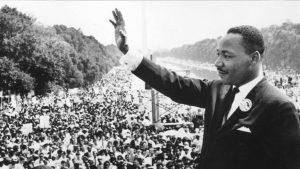Civil Rights Law: How 5 Significant Events Impacted the World of Modern Law
Written by Cooper & Friedman PLLC on February 20, 2017
Over the past 50 years, many important changes have impacted civil rights law in the United States. As civil rights attorneys serving people across Kentucky and Southern, Indiana, we understand firsthand the importance of these changes. Through our legal practice, we work hard to defend the rights of victims of many different kinds of discrimination. Follow along for an overview of 5 legal acts that have had an important impact on U.S. civil rights and civil rights law in America.
Civil Rights Law in America – An Overview of 5 Important Legal Acts
1. Civil Rights Act of 1964
In the summer of 1963, on June 11th, John F. Kennedy delivered a speech that called for the abolishment of discrimination based solely on color, race, sex, origin, or religion. On the same day, the President met with the House of Representatives to start discussing legislation of the bill. However, it wasn’t until after his assassination on November 22, 1963, when Lyndon B. Johnson entered the White House as President and much action was made on the bill. President Johnson said “No memorial oration or eulogy could more eloquently honor President Kennedy’s memory than the earliest possible passage of the civil rights bill for which he fought so long.” After much back and forth between the Senate and House, the bill was signed into law on July 2, 1964.
The final law was made up of 11 titles that gave civil rights to minorities across the United States, but this was only the beginning of another round of fighting for civil rights.
2. Voting Rights Act of 1965
LBJ took civil rights very seriously throughout his presidential term and a little over a year after passing the Civil Rights Act of 1964, he signed the Voting Rights Act of 1965 into law on August 6, 1965. The legislative piece was another fundamental step forward for Civil Rights Law and prohibited discrimination based on race in voting. The law was designed to guarantee voting rights given by the 14th and 15th Amendments to the Constitution. However, it also worked to secure basic voting rights for minorities – mostly aimed towards the South. Immediately after the bill was passed into law and enacted, racial discrimination decreased in voting. Additionally, the number of African Americans elected into public offices increased dramatically. The struggle for civil rights across the country gained another victory, and more momentum.
3. Civil Rights Act of 1968
Furthering his progress with cementing civil rights as a basic American right during his presidency, Lyndon B. Johnson signed a third civil rights law into effect on April 11, 1968 . During the height of the King Assassination Riots, the Act of 1968 focused on equal housing opportunities for minorities. This piece of legislation was nothing new, but more of an expansion on previous acts that prohibited discrimination based on race and religion in regards to housing. In 1974, discrimination against gender was incorporated into the act. And in 1988, protection for people with disabilities was added. Due to the heightened political climate after the assassination of Martin Luther King, Jr. and the riots occurring, Johnson wrote and added a provision that made it illegal to classify political protesting as violence.
4. Civil Rights of Institutionalized Persons Act
Prior to 1980 people institutionalized in prisons, mental health facilities, or nursing homes, were not protected with civil rights legislation. As a result, the Civil Rights of Institutionalized Persons Act was made into a federal law. This law added protections for people in mental health facilities, correctional facilities, and nursing homes. While not easily enforced and based in good faith, the Civil Rights of Institutionalized Persons Act did not eliminate discrimination. It did work to give victims of discrimination a voice, making it easier for them to seek damages in court.
5. Civil Liberties Act of 1988
In the middle of 1988, President Ronald Reagan signed the Civil Liberties Act of 1988 that gave Japanese Americans monetary restitution in response to being interned by the government during World War II. Three Senators – two from California and one from Wyoming – sponsored the act and Democrats in Congress heavily supported it while most Republicans opposed it. Out of the 120,000 Japanese Americans that were victims of internment during WWII, 82,000 of them received checks after 1990. Less than 20 years ago, the attorney general of the United States approved payment to the remaining claimants. Money aside, the Act of 1988 acknowledged and apologized for the injustice caused to Japanese Americans living in the United States and hoped to make peace with the culture as a country.
From the 1960s to the 1980s, modern law made huge advancements regarding the rights of human beings across the United States of America. People of different color, race, sex, origin, and religion were protected from discrimination in many different spheres of life including the workplace, housing, education and more. People who were institutionalized or mentally challenged were given civil rights protections, and Japanese Americans were compensated for past unfair treatment.
Without John F. Kennedy, Ronald Reagan, Lyndon B. Johnson, and many others, modern law may not be where it is today in terms of civil rights. Cooper & Friedman Attorneys at Law, headquartered in Louisville, KY, believes the best way to show thanks to those who fought for these rights is to support the fundamental rights of the citizens of Kentucky and Southern Indiana. If you have been the victim of some type of discrimination, get the legal help you deserve. The civil rights attorneys at Cooper & Friedman PLLC provide free case evaluations. For more info call 502-459-7555 now.


